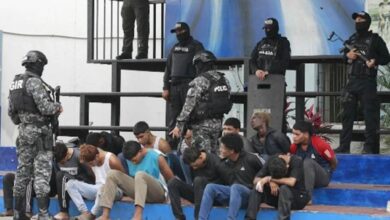What Do Security And Climate Change Have To Do With Each Other?
The worsening of conflicts and the creation of new tensions are imminent consequences of climate change. Therefore, it has begun to be addressed as a security issue as well

Photo: Freepik
LatinAmerican Post | María Fernanda Ramírez Ramos
Escucha este artículo
Leer en español: ¿Qué tienen que ver la seguridad y el cambio climático?
Climate change challenges institutions and governments, generating an economic, political and social impact. If not managed properly, it will impact societies creating new conflicts and aggravating current ones. The crisis will not only be environmental or a threat to biodiversity, the security, and quality of life of millions of people is at risk.
Fights for territory and natural resources, displacement of people, generation of new diseases, and worsening of the health status of the population are some of the consequences that are predicted in the near future or are even already occurring in many areas.
A publication of the World Meteorological Organization, which details the state of the climate during 2021, indicates that between 2015 and 2021 the warmest years were recorded. In this regard, with temperatures above 50 degrees Celsius, it will be impossible to live in many areas of earth.
This, added to the severe droughts, the food security crisis and the natural disasters caused by the damage to the ecosystems, will cause a much stronger competition for territories and resources. The most paradoxical thing is that most of the territories that are predicted to suffer the worst from the consequences of climate change are already areas with high economic, political and social vulnerability.
In fact, the United Nations began its approach to climate change with a security perspective in 2008 when it sent Jan Egeland, the UN Special Envoy for Climate Change, to do an assessment in the Sahel region. His conclusion was that the population was too vulnerable and extreme weather conditions. Undoubtedly, climate change would impact livelihoods, conflict and migration. The director of the UN Environment addressed the Security Council in 2011 to explain that the implications of climate change can be a driver of conflict and a danger to peacebuilding processes in many regions.
For these reasons, it is not surprising that organizations such as NATO are integrating issues related to climate change into their security strategy . In fact, in a statement they express that: “Climate change is arguably the first truly global security challenge since, according to UN reports, only 11 of the current 193 UN member states are not currently experiencing its impact. one way or another." It also points out how the armed and security forces will increasingly have to respond more in aid after natural disasters. They will also have to allocate resources for mitigation and adaptation measures.
You will like to read: Climate Justice: The Financing Of Environmental Projects Affects Latin America
What happens in Latin America?
"The impact of climate change in Latin America and the Caribbean will be considerable due to its economic dependence on agriculture, the limited capacity of its population to adapt, and the geographical location of some of its countries," says an investigation by the Organization of the United Nations for Food and Agriculture FAO, the Economic Commission for Latin America and the Caribbean ECLAC and the Latin American Integration Association ALADI.
On the other hand, the Climate Diplomacy organization points out that “From the melting of the Andes glaciers to the increasingly unpredictable floods in the Amazon basin, from the intensification of droughts in the Brazilian cerrado (tropical savannah) to the growing food insecurity in Central America, from extreme weather events in the Caribbean to changing rainfall patterns in Patagonia, the entire region is facing a host of emerging challenges.”
In this sense, these environmental situations will increase inequality in the region, which is already the region with the greatest inequality and social gaps. They will also challenge political stability and governance. In this sense, a publication entitled "Climate and Security in Latin America and the Caribbean", by the Igarapé Institute and the Institut Clima e Sociedade (iCS), points out that "A critical evaluation of the possible consequences of actions related to climate change should take non-climate issues into account because, after all, the social outcomes of climate actions do not occur in a vacuum.”
In this regard, states and institutions are called upon to create networks and integration strategies that allow them to jointly address problems arising from climate change and security. Likewise, at the same time, it is necessary to work with the communities in the development of capacities that make them resilient and allow them to mitigate and adapt to environmental damage. However, it is something urgent, which does not wait and must be addressed comprehensively. The knowledge of ancestral communities and the empowerment of social groups must be promoted to provide solutions.
The worsening of conflicts and the creation of new tensions are imminent consequences of climate change. Therefore, it has begun to be addressed as a security issue as well
Climate change challenges institutions and governments, generating an economic, political and social impact. If not managed properly, it will impact societies creating new conflicts and aggravating current ones. The crisis will not only be environmental or a threat to biodiversity, the security, and quality of life of millions of people is at risk.
Fights for territory and natural resources, displacement of people, generation of new diseases, and worsening of the health status of the population are some of the consequences that are predicted in the near future or are even already occurring in many areas.
A publication of the World Meteorological Organization, which details the state of the climate during 2021, indicates that between 2015 and 2021 the warmest years were recorded. In this regard, with temperatures above 50 degrees Celsius, it will be impossible to live in many areas of earth.
This, added to the severe droughts, the food security crisis and the natural disasters caused by the damage to the ecosystems, will cause a much stronger competition for territories and resources. The most paradoxical thing is that most of the territories that are predicted to suffer the worst from the consequences of climate change are already areas with high economic, political and social vulnerability.
In fact, the United Nations began its approach to climate change with a security perspective in 2008 when it sent Jan Egeland, the UN Special Envoy for Climate Change, to do an assessment in the Sahel region. His conclusion was that the population was too vulnerable and extreme weather conditions. Undoubtedly, climate change would impact livelihoods, conflict and migration. The director of the UN Environment addressed the Security Council in 2011 to explain that the implications of climate change can be a driver of conflict and a danger to peacebuilding processes in many regions.
For these reasons, it is not surprising that organizations such as NATO are integrating issues related to climate change into their security strategy . In fact, in a statement they express that: “Climate change is arguably the first truly global security challenge since, according to UN reports, only 11 of the current 193 UN member states are not currently experiencing its impact. one way or another." It also points out how the armed and security forces will increasingly have to respond more in aid after natural disasters. They will also have to allocate resources for mitigation and adaptation measures.




